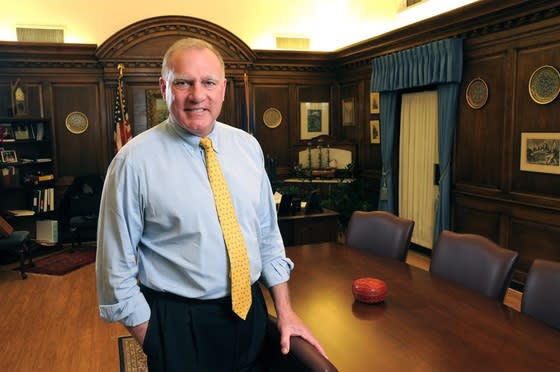State Among Frequent Opponents to Trump Administration Policies
[caption id="attachment_4823" align="aligncenter" width="560"]

Connecticut Attorney General George Jepsen. Courtesy Photo.[/caption] Connecticut has become one of the more active blue states in signing on to lawsuits or amicus briefs against the Trump administration, often joining challenges alongside New York and California. Connecticut Attorney General George Jepsen has joined New York Attorney General Eric Schneiderman and California Attorney General Xavier Becerra on most of the multistate lawsuits against the administration since Donald Trump took office. The Democratic attorneys general represent a slew of states that have put a spotlight on what they call an overreach by the administration. Jepsen, who has been attorney general for about seven years, said his office has signed on to about 30 lawsuits and amicus briefs this past year. All of the work is done in-house. Despite the volume, the workload requires few resources from his office. "The overwhelming majority of the legal actions that are taken involves our office reviewing someone else's work product and possibly offering suggestions," Jepsen said. In deciding what cases to pursue with other states, Jepsen said he first examines whether and how the issue affects Connecticut residents. Many of the lawsuits Connecticut joined have dealt with the environment, including opposition to the president's executive order killing the Clean Power Plan and opposing federal rules to subsidize nuclear power plants. The latest example came Wednesday when Jepsen's office joined New York in suing the U.S. Environmental Protection Agency over its alleged failure to control ozone pollution from upwind states. Jepsen said environmental issues should matter to everyone in the Nutmeg State. "For children and the elderly, especially, the issue is enormous. People are dying in Connecticut because of polluted air," Jepsen said. "Every one of us are breathing more polluted air than we should be because [EPA Administrator] Scott Pruitt is not enforcing the law." Most of the litigation is pending and could take months or years to conclude, but Jepsen said there has been progress. A federal appeals court ruled this past summer that the EPA cannot suspend a President Barack Obama-era rule that restricts methane emissions from new oil and gas wells. Jepsen scoffs at any notion that his office takes cases solely for political reasons. He said each case Connecticut joins is evaluated on its merits. It is not unusual for Democratic attorneys general such as Jepsen, Becerra and Schneiderman to lead the charge in filing lawsuits against a Republican president, just as it was not unusual for Republican attorneys general to file suits against Obama on issues related to his executive orders and marquee legislation, such as the Affordable Care Act. Though legal scholars say they believe the partisan divide has intensified in recent years. As far as future lawsuits or amicus briefs, Jepsen said stemming the opioid epidemic is something both parties have worked on. How attorneys and those in the legal community view Jepsen working with other states against the administration often comes down to party lines. Attorney Herb Shepardson, who was the head of the Connecticut Republican Party from 2002-04, said he is concerned about the motivation behind some of the lawsuits. "I have a lot of respect for George Jepsen and I think he has done many good things as attorney general," said Shepardson of Cooney, Scully & Downing. "But, the pursuit of some of these lawsuit could be problematic. I do have concerns for the motivation of some of these lawsuits." Shepardson declined to elaborate on how the pursuit of lawsuits could be problematic. Democrats counter that Jepsen is doing his job in the wake of what some see as an administration that has done everything in its power to undo Obama's legacy. "The Trump administration has really embraced social and legal policies that are very different from previous administrations," said Democrat John Thomas, a law professor at Quinnipiac University. "They have different environmental policies and different immigration policies, among others. It makes sense, to me, that this attorney general would voice his opinion about it."

